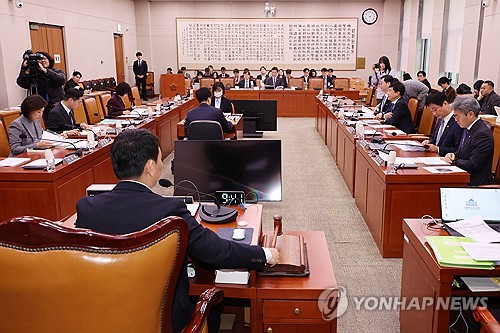
(Seoul=Yonhap Infomax) Da Ye On – A proposed amendment to the Prosecutors’ Office Act, dubbed the “three-year election ban for retired prosecutors,” which would bar former prosecutors from running for public office for three years after leaving their posts, was brought before the National Assembly’s Legislation and Judiciary Committee on the 24th but immediately faced constitutional controversy.
The committee’s first subcommittee reviewed the bill, spearheaded by Democratic Party lawmaker Kim Yong-min, but decided to defer further discussion.
Currently, South Korea’s Public Official Election Act requires public officials to resign at least 90 days before an election if they wish to run. The proposed amendment would impose a stricter rule specifically on prosecutors, prohibiting them from seeking elected office for three years after retirement.
The legislative intent is to safeguard the political neutrality of prosecutors, given their influence over investigations and indictments. However, the subcommittee raised significant constitutional concerns regarding the bill.
The committee’s legislative advisory office stated, “Expanding the restriction on prosecutors’ candidacy for public office to three years constitutes a further limitation on the right to hold public office (eligibility for election) under Article 25 of the Constitution. Therefore, the potential infringement of fundamental rights must be carefully examined.”
The Ministry of Justice also noted, “The proposed amendment, which singles out prosecutors and prohibits them from running for office for one (Min Hyung-bae’s bill) or three years after retirement, may infringe on the right to hold public office, freedom of occupational choice, and the right to equality. This requires careful review.”
However, the ministry acknowledged, “There is a practical need to restrict the candidacy of prosecutors, judges, High-ranking Officials’ Crime Investigation Agency (CIO) prosecutors, and police officers—positions requiring a high degree of political neutrality and independence—for a certain period after retirement.”
Some committee members questioned whether there is sufficient justification for imposing such a strict standard solely on prosecutors.
The National Court Administration commented, “There may be debate over whether the bill infringes on freedom of occupational choice and the right to hold public office, or whether it constitutes unreasonable discrimination compared to other public officials.”
They added, “Given that many public officials are required to maintain political neutrality, it is necessary to further consider whether it is appropriate to impose such restrictions exclusively on prosecutors.”
Lawmaker Kim Yong-min’s proposal also calls for retroactive application of the three-year restriction, which drew criticism for “excessively undermining trust in prosecutors.”
During the subcommittee meeting, both Kim Yong-min’s bill and a similar proposal by Min Hyung-bae, which would impose a one-year ban on retired prosecutors running for office, were reviewed and faced constitutional objections.
Kim Yong-min has also introduced an amendment to the Court Organization Act to impose a three-year candidacy restriction on retired judges.
While both the Prosecutors’ Office Act and Court Organization Act amendments are expected to be discussed further, their prospects for passage remain uncertain. The bills continue to face constitutional challenges and criticism that they amount to “targeted legislation” against prosecutors who protested the decision to drop the Daejang-dong trial appeal.
Even within the Democratic Party’s leadership, there are moves to rein in hardline lawmakers on the Judiciary Committee, including Kim Yong-min, and to moderate the pace of reform legislation. As a result, some observers view the three-year election ban as a warning message to prosecutors who defied party lines in the Daejang-dong case.
Previously, on the 19th, Kim Yong-min and other pro-government lawmakers on the Judiciary Committee filed a police complaint against 18 chief prosecutors who opposed dropping the Daejang-dong appeal.
dyon@yna.co.kr
(End)
Copyright © Yonhap Infomax Unauthorized reproduction and redistribution prohibited.

